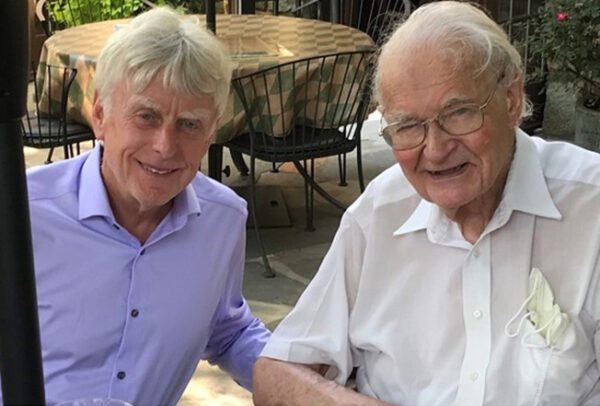Remembering Roger Pearson
James Gillespie, American Renaissance, April 5, 2023
Roger Pearson, anthropologist and publisher, passed away on January 4, 2023. (You may see other dates associated with his death, but they are incorrect.) He was 95 years old. I worked for Roger as webmaster for his various websites for about 25 years. While most of our communications were through email and by phone, I did have the pleasure of visiting him in person many times over the years, first at his office on 13th Street NW in Washington, and in his later years at an assisted-living facility. I stayed in contact with him up until a few days before he passed away. In this remembrance, I will concentrate less on politics and academics than on our relationship and what this outstanding man meant to me. Readers who would like to know more about his remarkable life and accomplishments will find much valuable information here.

The author and Dr. Pearson, August 2022.
By the time I met Roger in the mid-1990s, he had backed away from the very public presence he had maintained as both a university professor and as president of the World Anti-Communist League and publisher of politically oriented journals. At that time, he was hard at work editing his academic journals. Although no longer as much in the public eye as before, he was always extremely gracious and welcoming to strangers like myself who might come calling.
At the time of our first meeting, in the early days of the web, I had already set up and was managing a few other sites. Someone suggested I contact Roger about possibly building one or more websites for his projects. I spoke with him by phone and arranged to come by for a meeting when I was next in Washington.
On the day of that first meeting, at Roger’s office, I parked by his building and rang the buzzer at the door. A spry and smiling man of around 70 opened the door, graciously welcomed me, and escorted me past a large and impressive library to his office. He offered me a chair and we sat and talked — for hours. For all his erudition, Roger, on that day and always thereafter, was extremely easy to talk to. In addition to website matters, we talked often about certain topics:
- War (“the two world wars of the 20th century robbed Western man of his strength and even much of his intelligence”)
- Christianity (“it domesticated the Vikings”)
- The world leaders he had met: Pinochet of Chile (“impressive”), Somoza of Nicaragua (“not so much”)
- Climate change and environmental degradation (“real and troublesome problems”)
- His native Britain today (“a tragedy”)
- Previous generations (“they had much better posture”)
- Long-distance hiking (he had once crossed on foot from Burma to India with a group of mountain tribesmen during a monsoon)
We also frequently — and as time grew on, it seemed more frequently — discussed our respective families and our hopes and concerns for our children and future descendants. Roger at one point met my son, sent him a copy of his anthropology textbook, and inquired as to his welfare every time we talked from that moment on. That meant a lot.
Family was immensely important to Roger, both that of every individual and the wider family of the European peoples. One member of Roger’s family that he spoke of often was his older brother Philip, who had been killed as an RAF pilot in North Africa during the Second World War. Philip had been Roger’s idol and remained his hero for the rest of his life. He regarded his death and the deaths of four cousins and so many other Western men during that conflict as the death knell of Western civilization.
And, of course, bye and bye, we discussed that inevitable topic as well: death in general and death in particular. Roger had no fear of it and thought little of the religious and humanist conceit that individuals were intended for immortality. By the end of his life, his cohort had largely died out. He missed friends, as he missed his native Britain and his dear wife Marion, who had passed away some years earlier. While he remained actively engaged in his publishing work and with his family until the very day he died, he was ready to leave.
The accompanying photo was taken at a luncheon to which a long-time mutual friend and I treated Roger around his last birthday, in August 2022. We had a wonderful time, and on our departure, I told the restaurant staff we’d be back the next year. But I sensed, as I believe did Roger, we would not. Time was running out. A few months later, he was dead.
What did I learn from my 25-year friendship with Roger Pearson? A lot about humanity, about race and culture and history and Western decline. Most importantly, I think the thing I learned most about was something long-time AR readers understand: the importance of civility. It would not be a stretch, though it would be acutely sad, to call Dr. Roger Pearson the Last Civilized Man. He was an exemplar of intelligence, grace, good manners, and civility. It was an honor to call him friend.















